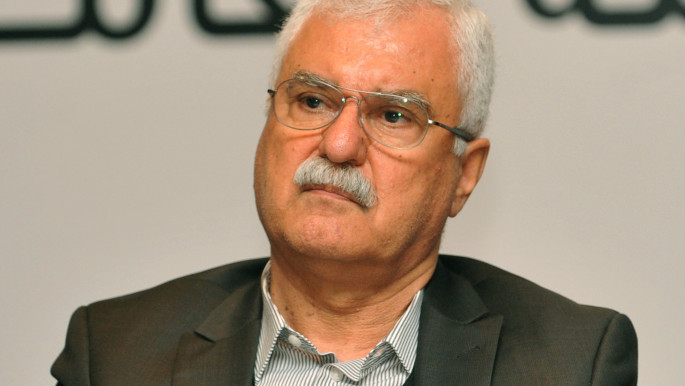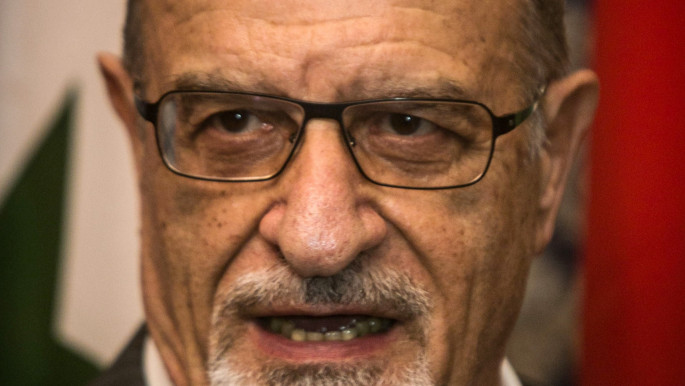Who are the members of Syria's opposition delegation?
However, the selections were well received by a broad segment of the Syrian opposition's supporters.
The opposition's delegation that will go to the Geneva talks, which have now been reportedly put on hold, includes 16 political and military leaders, including two women.
The New Arab profiles below the most prominent members who represent the key Syrian opposition and armed factions.
Asaad al-Zoabi
The head of the delegation is former Syrian army General Asaad Awad al-Zoabi.
Born in 1956 in the town of Maliha in the Daraa countryside, Zoabi joined the air force academy in 1974, graduating in 1977 with the rank of lieutenant. He is a former fighter jet pilot.
Zoabi served as military advisor in Yemen, and was head of the air force branch of the Supreme Syrian Military Academy, before he defected in August 2012. He then left to Jordan.
George Sabra
The opposition negotiating council appointed prominent Syrian opposition figure George Sabra as deputy head of the delegation. Sabra is a known dissident who has been active since the era of Hafez al-Assad, Bashar al-Assad's father.
Sabra was born in the town of Qatna west of Damascus in 1947. He worked in education and was an expert in educational curricula and educational television programmes.
 |
Mohammad is cousin of Zahran Alloush, the former leader of the Islamist rebel faction killed in a Russian airstrike last month |  |
 |
| George Sabra [AFP] |
Sabra co-authored the famed children's television show Open Sesame that first aired in the 1980s.
Sabra was a member of the Syrian Communist Party, which meant he was frequently harassed by Hafez al-Assad's secret police. He was detained in 1987 and sentenced to serve eight years in prison, which he spent in the notorious Sednaya military prison.
After his release, he was elected as member of the central secretariat of the Syrian People's Democratic Party, the rebranded communist party established by known Syrian dissident Riyad al-Turk.
When the Syrian rebellion began in mid-March 2011, Sabra led the protests in Qatna. He was detained for several months by regime security forces, and was tortured before he was released.
He left to Jordan on foot before moving to France and then Turkey, where he joined the opposition Syrian National Council.
Mohammad Alloush
To everyone's surprise, Jaysh al-Islam (Army of Islam) leader Mohammad Alloush was chosen as the chief negotiator for the opposition delegation. Mohammad is cousin of Zahran Alloush, the former leader of the Islamist rebel faction killed in a Russian airstrike last month.
Alloush was born in 1970 in Douma, the largest city in the Eastern Ghouta region near Damascus. He studied Sharia at Damascus University before continuing his studies in Medina, Saudi Arabia.
Alloush was among the earliest to join the rebellion, setting up several revolutionary institutions and organisations. He co-founded Jaysh al-Islam and headed its political bureau afterwards, representing it in political conferences including the Riyadh conference most recently.
 |
The negotiating commission selected two prominent women dissidents, Suheir al-Atassi and Basma Qadamani. |  |
Haitham al-Maleh
The delegation also includes Haitham al-Maleh, the most senior dissident and human rights defender in Syrian.
Born in Damascus in 1931, Maleh worked as a lawyer beginning in 1957 before becoming a judge, serving until 1966.
 |
| Haitham al-Maleh [AFP] |
He became politically active afterwards, and was detained between 1980 and 1986 under Hafez al-Assad, for demanding constitutional reforms.
He was detained again in 2009, and was sentenced by a military tribunal to three years in prison, but was released in March 2011.
In 2005, he signed along with a number of opposition figures the Damascus Declaration, calling for constitutional reforms and political pluralism in Syria.
He was among the first Syrian dissidents to join the rebellion, soon becoming a spokesperson for the revolution, but was forced to leave Syria. He co-founded the SNC and other bodies, and is currently head of the SNC Legal Commission.
Suheir al-Atassi
The negotiating commission selected two prominent women dissidents, Suheir al-Atassi and Basma Qadamani.
Atassi hails from a prominent Homs family with a long history in politics and government posts. The most recent member of the family who served in government was Nour al-Din al-Atassi, president of Syria who was detained for decades after Hafez al-Assad carried out a military coup in 1970.
Suheir al-Atassi was born in 1971, and holds a degree in French literature. She is daughter of Jamal al-Din al-Atassi, prominent pan-Arabist in Syria.
She was active in human rights and politics before the rebellion, and took part in the early protests in 2011 that preceded the revolution.
She was detained by the regime security services, and after her release, had to go into hiding in Syria before fleeing to Jordan and then France.
Atassi has been a member of several revolutionary bodies, including the SNC. She headed the Support Unit of the interim government handling projects inside Syria in opposition-held areas.
Basma Qadamani
Born in 1958, Qadamani is executive director of the Paris-based Arab Reform Initiative.
She left Syria in 1967, after her father was sacked from his post in the Syrian Foreign Ministry for criticising the Syrian government's conduct in the 1967 conflict with Israel.
She holds a PhD in political science.
Mohammad al-Hajj Ali
Maj. Gen. Mohammad al-Hajj Ali is another prominent military leader included in the delegation. He was the most high-ranking officer to defect from the Syrian army.
Hajj Ali was born in 1954 in the town of Kherbet Ghazala in Daraa, southern Syria. He enrolled in the military academy in 1974 and graduated in 1977 with the rank of lieutenant.
He holds a PhD in national strategy from the Nasser academy in Egypt.
Hajj Ali was appointed head of the mechanised brigade of the Syrian army, serving between 2005 and 2008. He was then appointed head of the National Defence Academy in 2008, and served there until he defected in August 2012.
Mohammad Khallouf
Maj. Gen. Mohammad Nour Izz al-Din Khallouf was head of the supplies and logistics division of the Syrian regime army before defecting in March 2013. He then left to Jordan, before becoming deputy ministry of defence in the Syrian interim government.
Mohammad al-Hakim
Mohammad Nathir al-Hakim is a dissident affiliated to the Muslim Brotherhood.
Born in Aleppo in 1950, he holds a PhD in electronics and a PhD in research management. He is a professor in French universities and has also worked for French industries.
He joined the Islamist movement in Syria since his youth. Hakim was forced to leave the country in 1976 because of his anti-Assad activism.
He co-founded the SNC and its successor body the Syrian National Coalition, serving as member of its political commission.
 |
Fouad Aliko represents the Kurdish constituency in the Syrian opposition delegation. He hails from the city of Derbassieh in Hasakeh province, north-eastern Syria |  |
Fouad Aliko
Fouad Aliko represents the Kurdish constituency in the Syrian opposition delegation. He hails from the city of Derbassieh in Hasakeh province, north-eastern Syria. He is member of the political commission of the Kurdish Democratic Unity Party in Syria (Yekiti).
He is an opponent of both the Assad regime and the Syrian Democratic Union Party. He is member of the Kurdish National Council and the SNC, and is opposed to Kurdish separatism.
Abdul-Basset al-Tawil and Mohammad Abboud
The delegation includes other military and political figures, including Col. Abdul-Basset al-Tawil, commander of the northern region in the Free Syrian Army, and Maj. Mohammad Abboud, a leading FSA officer in the eastern front.





 Follow the Middle East's top stories in English at The New Arab on Google News
Follow the Middle East's top stories in English at The New Arab on Google News


